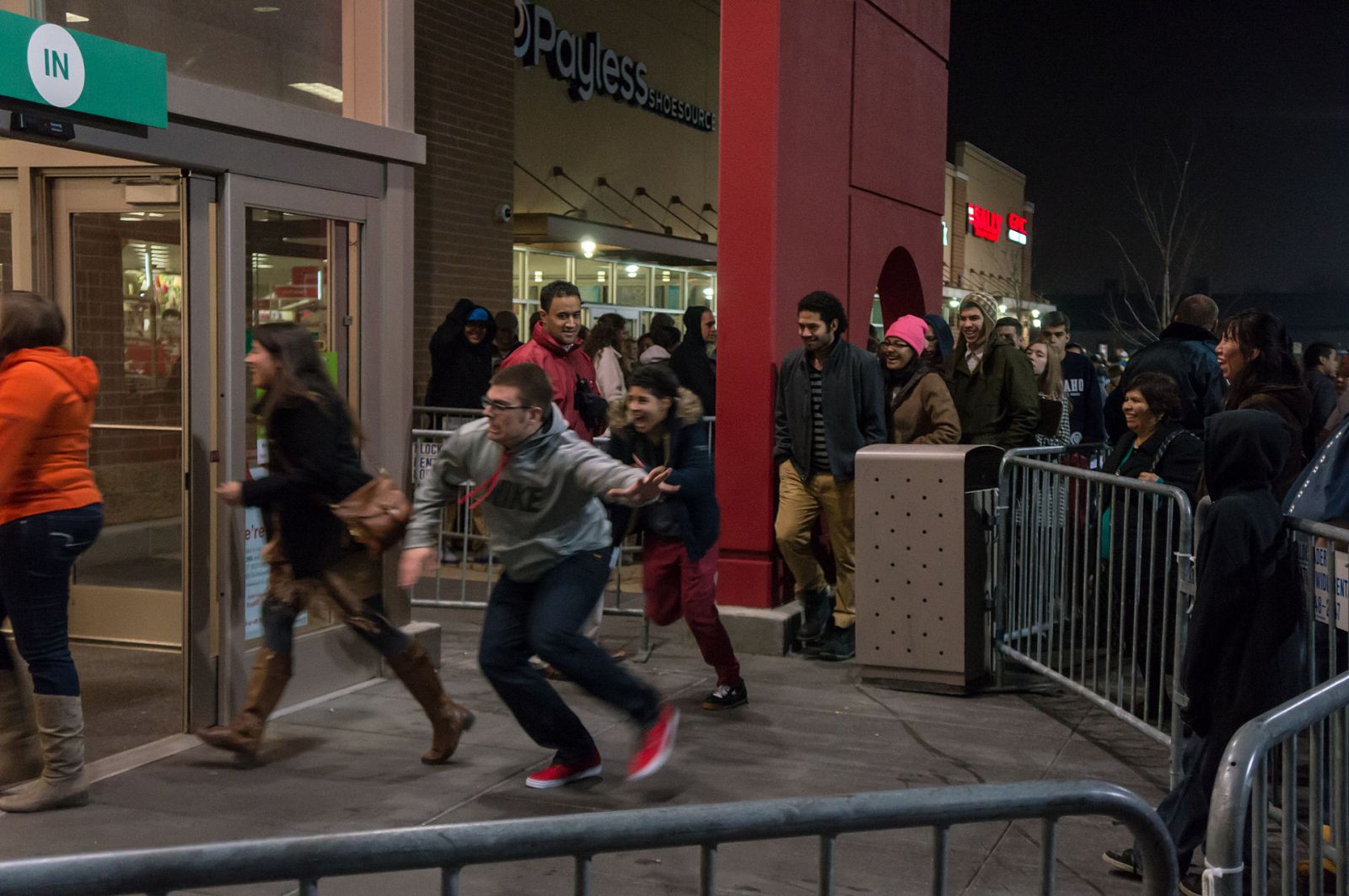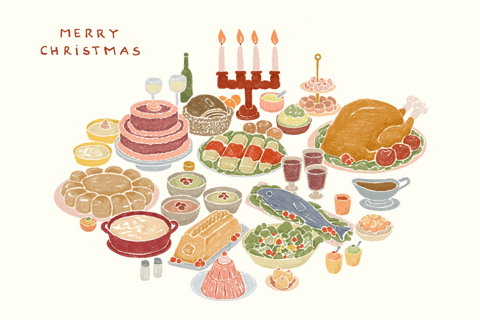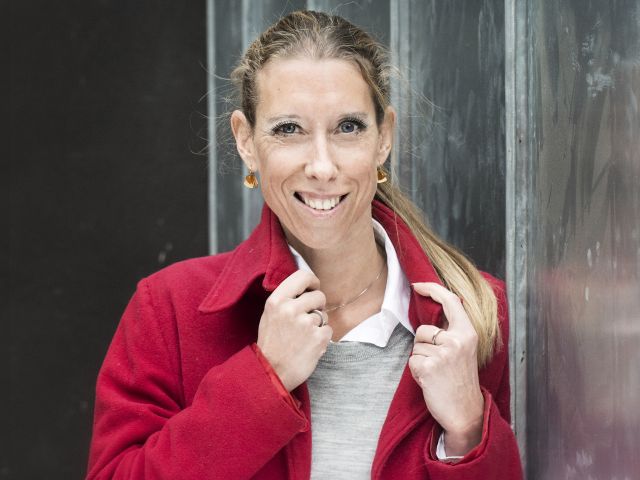Black Friday lures us with more than just knock-out offers – it stimulates our bonding hormone

Our longing for togetherness is what makes us queue up on Black Friday for cut-price flat screens and super-stretch trekking pants, explain two CBS researchers. They also answer whether our focus on sustainability might eventually kill the need for consumer frenzies.
Black Friday is not everyone’s cup of tea. And perhaps with good reason.
In America, lines backing up hundreds of meters are not uncommon, followed by consumers swarming malls in a ballistic hunt for the greatest deal of them all. No matter the cost. Whether it be an elbow in the ribcage or an intense tug-of-war over a bathmat in the Home Decorations department.
More and more people are highlighting this consumption hysteria at a time when the climate is high on the global agenda.
In Denmark, the situation is – mostly – better than in America, although people do start queuing at an unearthly hour outside shops with knock-out offers on Black Friday.
So, what is it about Black Friday that means we just can’t keep away from the glistening shop windows plastered in yellow sale signs? And isn’t a shopping phenomenon like Black Friday doomed in these sustainable times anyway?

CBS WIRE asked Lucia Reisch, Professor of Sustainable Consumption at CBS, and Jesper Clement, Associate Professor of Consumer Behavior at CBS, and their answers are not what you might expect.
Most of us would imagine special offers are what tempt us to participate in Black Friday, yet more factors are involved, as Jesper Clement explains.
“We are humans, and we love spending time with others. If there’s a national football game on a big screen at City Hall Square, people turn up even though they don’t care much about football. The same thing happens on Black Friday,” he says and continues:
“When we join in events like Black Friday or sing in a choir with other people, we produce Oxytocin, also known as the bonding hormone. We experience that everyone is in the city for the same reason or that our fellow singers in the choir are special to us, and we enjoy that.”
If we had the event ‘Culture Night’ on Black Friday, we might see people wanting to do that instead of going shopping
Jesper Clement
Wait a minute. So, queuing for a special pair of sneakers with 50 other shoppers makes us bond together? But surely the shoppers creating havoc in America are not bonding that much.
“What happens in those situations is special. You get a kick of dopamine from getting what you really wanted. Especially if there’s only one of the items left. But that’s not the usual experience. In Denmark, Black Friday is much more about having a good time,” says Jesper Clement.

Like Christmas – it makes us happy
Having a good time is what makes Black Friday such a hit, argues Jesper Clement. And it doesn’t really make a huge difference that newspapers and media write the usual articles about many of the offers not being such great bargains after all.
“It’s a success because it can get us out and mobilized towards the same goal. That makes the difference. You can easily check whether a deal is good or not, but in this case, our feelings drive us, and when we see other people doing the same and they are happy, we feel the same,” he says.
Hmm… Perhaps Jesper Clement is onto something. When I was a teenager, I worked at the local bakery store in my hometown Malling. I always made sure to take the shifts on Christmas Day and New Year’s Eve because I enjoyed the vibrant atmosphere in the store when people would happily queue for rolls, loaves of rye bread for their Christmas lunches, and marzipan ring cakes decorated with serpentines for the celebrations at midnight.
“Black Friday wouldn’t work for an entire week. And Christmas Day and New Year’s Eve are the same. As these events last for just one day, they feel very special and intense,” says Jesper Clement.
And although many people prefer to avoid the shopping mayhem, Black Friday wouldn’t exist in an online format only.
“Maybe shopping online on Black Friday is more rational, but that doesn’t really explain why it remains a success. All the negative reports about Black Friday won’t put us off, and if you get a good deal, enjoy it,” says Jesper Clement.

Professor Lucia Reisch agrees that Black Friday is a day of collectiveness. Something we do together. And let’s face it, a smashing deal can get most of us excited.
“In the US, the big success is based on the prices, but also on the timing – the day after Thanksgiving, which is the second-largest family holiday in the US after Christmas. “Black Friday” is a holiday for many employees. If there are no attractive alternatives, people love going shopping on their days off,” she says and adds:
“And people are very price-sensitive, which is basically a smart strategy,” she says.
What is it really worth?
Over the past few years, Black Friday has snowballed, despite the ongoing debate about and actions promoting a greener society. And in a green and sustainable society, the buy-and-throwaway culture, which some people argue Black Friday represents, seems counterproductive.
For example, the Danish fashion designer Mads Nørgaard has closed his shops and webshop on Black Friday for the past couple of years. IKEA won’t put items on sale in Denmark. Instead it encourages its customers to buy IKEA furniture from the second-hand marketplace dba.dk. And the outdoor equipment store REI closes all its shops and asks its employees and customers to spend a day off together in the open air.
“The one and only goal of Black Friday is for people to consume more – no matter what. On this day, prices are irresistibly reduced and consumers’ buying barriers are lowered to the minimum. This is the complete counterstrike to sustainable consumption,” says Lucia Reisch.
She is afraid that super-spending days like Black Friday, which focus on bargain hunting, make people forget to reflect on what and why they buy.
“Consuming sustainably requires you to reflect on your needs and wants. To carefully check the quality of the product and to consider whether not buying, but sharing, leasing or making it yourself would be a smarter decision. Smarter for you, the climate and people, as cheap prices have their true cost somewhere in the value chain,” she says and continues:
“The worst effect might be that the sense of materials and products having value is lost.”
But even concerns about the climate and the state of the planet won’t keep us from checking whether a special offer is waiting out there for us, argues Jesper Clement.

“If there’s something we humans are especially good at, it is justifying our actions. ‘Yes, the climate is deteriorating because of overconsumption – but I still need to buy Christmas presents, so I might as well do it today’ could be one example,” he says and continues:
“Also, I haven’t checked this, but maybe people wait to buy things like flat screens until Black Friday. So instead of buying them in October or early November, they wait until Black Friday. This isn’t necessarily overconsumption, but a smart move to save money,” he says.
Black Friday can be replaced… perhaps
Black Friday as a concept had its breakthrough in Denmark in 2015. This day beat all records for sale transactions on one day, according to the news station TV2. In total, the Danes shopped for DKK 1.98 billion. Since then, the figures have dropped somewhat. In 2018, the Danes spent DKK 1.94 on Black Friday.
Will the figures drop again this year? When asked if the focus on sustainability and the future of planet Earth will make people think twice before buying, Lucia Reisch replies:
“I can only hope so, and it’s time to set attractive and smarter European alternatives to the hyper-commercialized US model.”
Jesper Clement, on the other hand, thinks we need an equally appealing event that offers the same sensations – but is not focused on consuming – if we want to pull the plug on Black Friday.
“Doing things together might be a viable alternative. So, if we had the event ‘Culture Night’ on Black Friday, we might see people wanting to do that instead of going shopping, because it’s an alternative that can give us the same feeling of togetherness. We are emotionalists, and these hormones and feelings largely overshadow everything else,” he says.






































































































































Comments